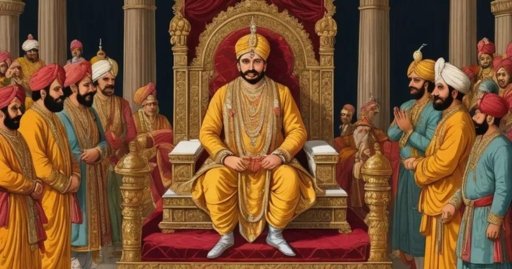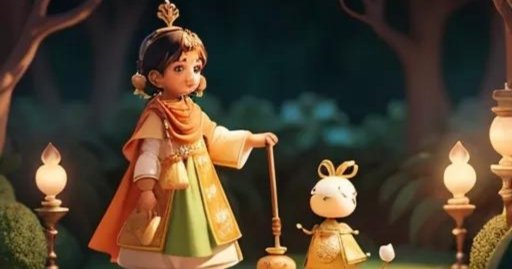The Three Best Akbar and Birbal Stories
The tales of Akbar and Birbal hold a special place in Indian folklore. These stories not only entertain but also impart wisdom and moral lessons. Birbal, the witty advisor of Emperor Akbar, is the central figure in these anecdotes, solving problems with his cleverness and wit. In this article, we will delve into the top 3 Akbar and Birbal stories, exploring their narratives, lessons, and enduring charm.
1. The Testing of Wisdom Story

One day, Emperor Akbar, wanting to test Birbal’s wisdom and his ability to think on his feet, decided to pose a challenging question to his court.
Akbar asked, “Birbal, tell me the difference between truth and falsehood in three words.”
The court was silent, as everyone pondered over the difficult question. Birbal, however, remained calm. After a few moments, he smiled and responded, “Four fingers, Your Majesty.”
The courtiers were puzzled, and so was Akbar. He asked Birbal to explain his answer. Birbal said, “Your Majesty, the difference between truth and falsehood is just four fingers. That is the distance between our eyes and ears. What we see with our eyes is the truth, and what we hear with our ears could often be falsehood.”
1.1. Important Characters in “The Testing of Wisdom Story”
- Emperor Akbar
The wise and curious Mughal emperor who loves to challenge his courtiers. - Birbal
The intelligent and witty advisor of Akbar, known for his clever responses.
1.2. Moral of “The Testing of Wisdom Story”
This story teaches us the importance of discernment. It reminds us that seeing is believing and that we should not always trust what we hear without verifying it ourselves.
Watch – The Lion and the Mouse Story
In this insightful video, we explore the timeless fable of “The Lion and the Mouse,” which teaches us about the value of kindness and the importance of helping others, regardless of their size or status.
The story of “The Lion and the Mouse” reminds us that acts of kindness, no matter how small, can have significant impacts. It highlights the importance of mutual respect and cooperation in our daily lives.
2. The Magic Stick Story
Emperor Akbar once declared that whoever could fool Birbal would be rewarded handsomely. Many tried but failed. One day, a farmer approached the court with a plan to deceive Birbal.
He brought with him a long stick and claimed that it was magical. The stick, he said, could measure the honesty of a person.

The farmer explained to Akbar that if the stick grew longer by the next day, it would mean that the person it was meant for was dishonest. Akbar was intrigued and called Birbal. He told Birbal to keep the stick overnight and return it the next day.
Birbal agreed. That night, Birbal had a thought. He cut an inch off the stick and kept it aside. The next day, when Birbal presented the stick to the court, it was indeed shorter. The farmer was dumbfounded and confessed that the stick was just an ordinary stick, and he had tried to deceive Birbal.
2.1. Important Characters in “The Magic Stick Story”
- Emperor Akbar
The fair and inquisitive ruler who enjoys testing Birbal’s cleverness. - Birbal
The astute and quick-thinking advisor to Akbar. - The Farmer
The man who tries to deceive Birbal with a fake magical stick.
2.2. Moral of “The Magic Stick Story”
This story highlights Birbal’s quick thinking and intelligence. The moral is that honesty and intelligence will always prevail over deceit and trickery.
Watch – The Elephant and the Ant Story
This engaging video presents “The Elephant and the Ant,” a story that underscores the virtues of humility and resilience, demonstrating how even the smallest creatures can make a difference when they persevere.
“The Elephant and the Ant” serves as a powerful reminder that true strength lies not in size, but in determination and persistence. It encourages us to value every individual’s potential, regardless of their apparent limitations.
3. Birbal’s Khichdi Story

One winter morning, Emperor Akbar and Birbal were taking a walk along the lake. Akbar said, “I don’t believe anyone can stay in the cold water of this lake all night, just for money.”
Birbal disagreed and said that he knew a poor man who would do it. Akbar challenged Birbal to prove it.
Birbal found a poor man who agreed to stay in the lake all night for a reward. The next morning, the man came out of the lake, and Akbar asked how he managed to stay in the freezing water. The man said, “I kept my eyes fixed on a lamp burning in a distant house and that gave me the strength to stay in the water.”
Akbar then declared that the man had warmed himself with the light of the lamp and thus did not deserve any reward. The poor man went to Birbal for help.
The next day, Birbal did not go to court. When Akbar sent for him, the messenger found Birbal cooking khichdi in a pot hanging high above a small fire. The pot was so high that the fire could not possibly cook it. Akbar was puzzled and asked Birbal what he was doing.
Birbal replied, “I am cooking khichdi, Your Majesty.” Akbar laughed and said, “How can the khichdi cook when the fire is so far away?” Birbal answered, “The same way the poor man received heat from a lamp that was far away from him.” Akbar understood his mistake and rewarded the poor man.
3.1. Important Characters in “The Birbal’s Khichdi Story”
- Emperor Akbar
The just and sometimes skeptical ruler who challenges Birbal. - Birbal
The wise and empathetic advisor who helps those in need. - The Poor Man
The man who accepts the challenge to stay in the cold lake. - The Messenger
The court servant who delivers Akbar’s messages.
3.2. Moral of “The Birbal’s Khichdi Story”
This story teaches the importance of empathy and fairness. It highlights how misunderstanding and lack of empathy can lead to unjust decisions, and how wise counsel can correct such errors.
Watch – The Thirsty Crow Story
Join us in this video as we delve into “The Thirsty Crow,” a classic tale that highlights the importance of ingenuity and resourcefulness in overcoming life’s challenges.
“The Thirsty Crow” illustrates the power of creative problem-solving and persistence. It inspires us to think outside the box and remain steadfast in the face of adversity to achieve our goals.
For more such educational and entertaining tales, you can visit our Kids Stories page now!
Final Thought
The stories of Akbar and Birbal, including “The Testing of Wisdom,” “The Magic Stick,” and “Birbal’s Khichdi,” continue to be cherished for their wit and wisdom. Each tale presents a scenario where Birbal’s cleverness and presence of mind resolve complex situations, leaving us with valuable moral lessons. These stories, available in multiple languages including Hindi and English, offer timeless lessons that remain relevant across generations. Whether you are reading an Akbar and Birbal story in Hindi or an Akbar and Birbal story in English, the charm and wisdom of these tales remain undiminished.
Search
Categories
- All Reviews (6)
- Amazing Facts (21)
- Computer Accessories (2)
- Dell Laptops (1)
- Drones (1)
- Educational Resources for Kids Crew (21)
- English Stories (10)
- Hindi Stories (9)
- Kids Stories (18)
- Kidz Crew (32)
- Laptop Products (1)
- Wireless Devices (2)



